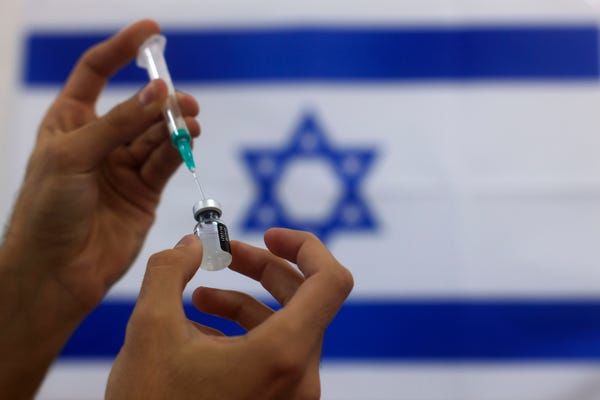
Israel study reports 94% drop in symptomatic COVID-19 cases among people who receive 2 doses of Pfizer vaccine
People who get the Pfizer-BioNTech coronavirus vaccine are far less likely to develop symptomatic or severe COVID-19, according to a new study out of Israel.
Researchers from Israel's largest healthcare provider, Clalit, looked at 600,000 Israelis who had received two doses of the Pfizer shot.
They reported a 94% drop in symptomatic coronavirus infections — when patients develop symptoms like fever or shortness of breath — among people who had been vaccinated compared to those who had not, Reuters reported Sunday.
The preliminary study, which has not yet been peer-reviewed, also found that people who had been fully vaccinated were 92% less likely to develop severe COVID-19 that may require hospitalization, intensive care, or a ventilator.
'Extremely effective in the real world'
 An Israeli military paramedic prepares a Pfizer COVID-19 vaccine, to be administered to elderly people at a medical center in Ashdod, southern Israel, January 7, 2021.
An Israeli military paramedic prepares a Pfizer COVID-19 vaccine, to be administered to elderly people at a medical center in Ashdod, southern Israel, January 7, 2021.In December, Pfizer reported its vaccine was 95% effective at preventing symptomatic coronavirus infections during clinical trials. The new Clalit study underscores that effectiveness among the general public outside of a controlled trial setting.
"It shows unequivocally that Pfizer's coronavirus vaccine is extremely effective in the real world a week after the second dose, just as it was found to be in the clinical study," Ran Balicer, Clalit's chief innovation officer, told Reuters.
He added that the vaccine is even more effective two weeks after the second shot.
Clalit Health Services covers more than half of Israel's patients, which may make it easier for Clalit researchers to compare vaccinated and unvaccinated people.
They compared the 600,000 people who had received two Pfizer vaccine doses to an unvaccinated group of the same size. Both groups had similar medical histories.
According to the Wall Street Journal, 430,000 of those people were between the ages of 16 and 59 years, and 170,000 who were age 60 or older.
So far, Israel has fully vaccinated 28.5% of its population. That's more than any other country.
Clalit's recent research is the largest vaccine study in the country to date.











